Biography
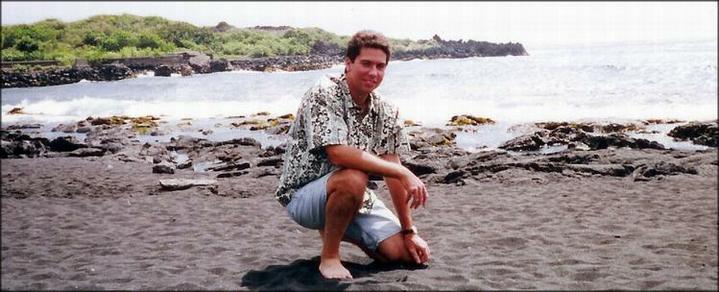
With well-tanned skin and rugged good looks, when Bill Wynne steps on-stage in a vintage aloha shirt with a guitar or an `ukulele in his hand, he is frequently mistaken for being Hawaiian. He is quick to point out that he is not Hawaiian - not because he wouldn`t love to be Hawaiian (because that would go a long way toward explaining what Wynne is all about), but because he isn`t and has no intention of perpetrating a hoax on his audience. But when Wynne opens his mouth to sing an old-fashioned Hawaiian song in the Hawaiian language, the shadow of doubt and confusion falls over the audience again and they cannot help but ask, "Is he sure he isn't Hawaiian?"
The question audiences should be asking is, "How did a guy from New Jersey with no Hawaiian lineage learn to play `ukulele, slack key guitar, steel guitar, and sing falsetto in the Hawaiian language so convincingly?" The answer lies in Bill's deep love of the Hawaiian people and their culture. Born on October 2, 1970 in Philadelphia, Pennsylvania to a Filipino-Spanish-Lithuanian father and an English-Welsh-German-Cherokee mother, Bill Wynne came into this world as part of a family already deeply steeped in Hawaiian music and culture and into the local Hawaiian community on the East Coast where Hawaiian ex-patriots abound.
The Beginning
Bill's grandfather, Liborio, who could play any stringed instrument handed to him, made his way from his native Philippines to Hawai`i during the 1930s where he immediately befriended local musicians and soon found himself playing upright bass, guitar, and mandolin around Honolulu. Although he did not stay long, Bill's grandfather brought his love of Hawaiian music with him to his next destination - Philadelphia. Liborio married and had two sons - one of whom, Bill's father, fell in love with this music, as well, and learned to play steel guitar. By the time Bill came along, his parents had already been performing Hawaiian music on the East Coast for many years and, as a result, the family was favored by all of the local Hawaiians. Bill was instantly adopted into that very tight-knit Hawaiian community and raised in the knowledge of all wonderful Hawaiian things by the local kupuna (Hawaiian for "relatives and friends of our grandparents' generation).
Bill recalls that "Hawaiian music was the only music played around our house. But I wasn't much interested. My father was into the territorial era, hapa-haole music - this slow, languorous music that wasn't quite enough to captivate the imagination of a child of the 1970s. My friends all listened to rock-and-roll. And I just wanted to fit in, so that's what I was listening to, as well. In a sense, I guess I was rebelling against my parents." However, Bill's opinion of Hawaiian music slowly began to change as the local kupuna would return home from their trips to Hawai`i with stacks of the latest records for Bill. During a period of just a few years, three of those recordings changed Bill's life forever: "Young Hawai`i Plays Old Hawai`i" by Hui `Ohana, "Sunday Manoa 3" by Sunday Manoa, and "No Kristo" by the Makaha Sons of Ni`ihau. "It was something about the sound - something different," Bill says somewhat excitedly. "The backbeat, the instrumentation, the language - everything! It wasn't Hawaiian music as I knew it. It was a little country, a little rock-and-roll, a little jazz, a little classical, and still a whole lot Hawaiian. That was the first time I heard slack key guitar, the first time I heard falsetto singing... I received these three records all around the same time, and I knew from the first listen that Hawaiian music was going to be a huge part of my life." Those first few LPs started Bill on a lifelong journey into the evolution of Hawaiian music and a collecting frenzy that continues to this day. Twenty-five years later, Bill has amassed more than 2,000 Hawaiian LPs, CDs, 45s, 78s, cassettes, and songbooks.
Learning...Hawaiian Style
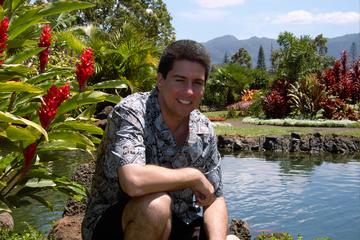
Nearly everything Bill has learned about Hawaiian music comes from the careful study of these recordings. "I learned from the best," Bill exclaims before rattling off a long list of Hawaiian music dignitaries that includes Bill Ali`iloa Lincoln, John Pi`ilani Watkins, John Almeida, Pauline Kekahuna, Andy Cummings, Aunty Vicki Ii, Aunty Genoa Keawe, Kahauanu Lake, Eddie Kamae, Bill Kaiwa, Marlene Sai, and Sonny Chillingworth. "It didn't hurt that so many of those classic recordings had the song lyrics and translations on the album covers. On the other hand," Bill remembers painfully, "it was sometimes difficult to reconcile what I heard on the record with the printed version. It is much easier these days - now that the concern for the language has become a priority for all who care about the Hawaiian culture and the diacritical marks that are essential to the language are being used appropriately. But 30 years ago, I had to listen even more closely."
Bill spent most of his childhood carefully examining these recordings in his headphones - trying to recreate any and every sound he heard while trying not to disturb the neighbors. At a very early age, Bill learned the `ukulele solos of Eddie Kamae and Herb Ohta note for note. He then moved on to slack key - favoring the sounds of Sonny Chillingworth and Ledward Kaapana. "I guess I liked the sound of slack key on the electric guitar," Bill admits. "But Sonny and Led were innovators in other respects, as well." He stuck with the `ukulele and slack key guitar for many years before making the leap to steel guitar - as with the other instruments, beginning his study by attempting to emulate steel guitar greats like Barney Isaacs and Joe Custino, but quickly finding his own style. All the while, with no native Hawaiian speakers close by to teach him, Bill learned to sing hundreds of old Hawaiian songs by comparing the recordings to the printed lyrics and translations. "After all, you can't sing these songs without knowing the meaning," Bill admits. "The full meaning," Bill is quick to add. "It is simply some of the most beautiful and expressive poetry ever written in any language. How can one attempt to sing the song with feeling if some layer of meaning remains concealed?" To that end, Bill has sought out lyrics and translations from every possible source - from the Bishop Museum's archives to the haku mele themselves. Although falsetto singing was a natural extension of Bill's study of Hawaiian music, like all young men who have embraced this art form, it merely had to wait until Bill's voice had changed. But by the time Bill had reached his teen years, he had begun singing falsetto - and he hasn't stopped since! And it has become his favorite aspect of Hawaiian music. "The first time I heard Dennis Pavao and the Brothers Cazimero, I wanted to sing like that. It just took time for my voice to change before I could figure out how to do it. Technically, it is very easy to do. However, it's a whole lot more difficult to make it sound pretty."
Compromises and Departures
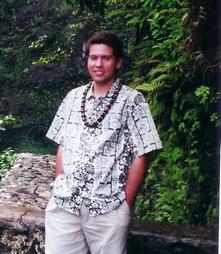
Of course, having immersed himself in Hawaiian music at a very early age, Bill nearly completely cut himself off from his friends and what should have been a mutual love of rock-and-roll. Although that may have bothered him once-upon-a-time, Bill says that it's merely an afterthought now. "I made a choice," Bill says without a hint of regret. "I'm not sure how to describe it, but... I suppose I didn't really fit in with the neighborhood kids even before I fell in love with this music. I was a bookworm and not at all athletic. Hawaiian music became an escape from what would have otherwise been a pretty unhappy childhood. It was an outlet for all of that pent-up kid energy. And Hawaiian music was a connection with a very special people that loved me so well. To this day, I cherish those relationships with all of the local aunties and uncles." When performing for an audience, Bill puts a more humorous spin on the subject. "I used to collect Hawaiian records like other kids collected baseball cards," Bill jokes. "I knew all the players and all their stats, but for some reason nobody ever wanted to trade with me!"
During his high school years, while continuing his intense self-guided study of Hawaiian music, Bill found interest in other musical idioms like classical and jazz. He discovered jazz guitar greats like Joe Pass, Barney Kessel, and Herb Ellis and - just as he did with slack key and steel guitar - Bill listened carefully and learned to play jazz. He performed in musical theater and placed first in three statewide solo vocal competitions. In college, Bill majored in linguistics so that, in lieu of a native Hawaiian speaker to help him with the Hawaiian language and with understanding the intricacies of Hawaiian poetry, he could find the tools that he might use to attempt to dissect the language and find the hidden meanings in the songs he desired to sing. Bill also studied music theory and opera and wrote classical guitar pieces and vocal arrangements for both a barbershop quartet and a jazz choir - and even used his self-training in Hawaiian falsetto to sing countertenor in a chamber choir! These other musical idioms began to more deeply inform Bill's own style of Hawaiian music and, without trying, Bill began to create a variation of the Hawaiian music he had been making - a style which most would call "contemporary Hawaiian" but which Bill simply calls "Hawaiian."
Return To Roots and the Rewards
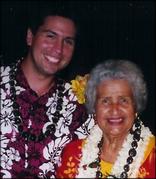
Bill returned home from college and continued to play Hawaiian music anywhere people wanted to hear it - from backyard lu`au for his cherished kupuna, to gatherings of Hawaiian student clubs at local universities, to Atlantic City's largest casino/hotels (with his father's Hawaiian revue). In 1994, he produced - with the assistance of the local Hawaiian community - a two-day Hawaiian music festival in Philadelphia. He also began putting his musical ideas down on tape on an inexpensive four-track recorder. Even though Bill hadn't yet made the trip to his musical "mecca," his recordings began making the trip to Hawai`i on a regular basis in the suitcases and purses of the local Hawaiians making their annual trip home. Without Bill's knowledge, those early demos began making their way into the hands of Bill's musical idols - prompting one recording artist and music teacher to extol, "Bill has as Hawaiian a sound as any I've ever heard. It's obvious he's been doing his homework."
In 1996, Bill was invited to perform as one of three opening acts for a Portrait of Hawai`i's Music concert at Carnegie Hall - a show featuring Robi Kahakalau, Cyril Pahinui, the Makaha Sons, and the late Loyal Garner and Dennis Pavao. And finally, in October 2000 on his first ever trip to Hawai`i, Bill fulfilled his lifelong dream of singing with his falsetto idol, Aunty Genoa Keawe. "Better than Carnegie Hall any day of the week," Bill gushes. On that same trip, Bill celebrated his 30th birthday by singing at the Halekulani Hotel's House Without A Key with Alan Akaka, Sonny Kamahele, and Kaipo Asing.
And, then, the unthinkable: The outsider from New Jersey entered the Aloha Festivals Falsetto Contest. He competed on O`ahu in 1993 and twice more in 1994 on O`ahu and the Big Island (taking Second Place and Third Place, respectively). He returned to the Big Island's contest in 2005 and took Second Place yet again - and began to believe that he would forever be "a bridesmaid." But he stuck around Hawai`i for another few weeks and on September 24, 2005, on the historic stage of the Monarch Room at the Royal Hawaiian Hotel in Waikiki, singing a long forgotten song by another falsetto hero, Bill Ali`iloa Lincoln, Bill wowed the crowd - and the judges - and took home First Prize in both the Voice and Hawaiian Language categories - earning him a recording contract with the venerable Hula Records label.
Bill returned to Hawai`i in July 2006 to record the CD which earned him favor among still more Hawaiian music legends who had not heard of him before. Since then, Bill has performed all over Hawai`i - venues as grand as the Royal Hawaiian Hotel and the Halekulani Hotel and as modest and "local" as Chiko's. In most of these cases, he has had the privilege and honor of performing with his Hawaiian music heroes. Bill has fulfilled his dream of acceptance into the Hawaiian music community. And Hawai`i has not only become his "home away from home" but, as he often jokes, his own real-life "Cheers" - where "everybody knows his name."
The Future
As fulfilling as Bill's journey in Hawaiian music has been, the trip isn't over yet. At 37 years old, Wynne - a veritable encyclopedia of Hawaiian music history who can identify a steel guitarist, slack key guitarist, or singer by merely listening to them play or sing just a few bars - still has quite a lengthy "To Do List" - including writing a book tracing the evolution of Hawaiian music, producing a syndicated radio show of rare Hawaiian music, learning to speak Hawaiian, and releasing more recordings of his music. His motivations are seemingly selfless. "Hawaiian music touches my heart like no other kind of music," Bill says. "And when music grips you like that, you can't just sit back in your chair and tap your foot. At least, I can't, anyway! I want to participate in some meaningful way in the perpetuation of this music. This music is the heart and soul of the most beautiful people I have ever known and the embodiment of everything that they stand for. Hawaiian music has taken a lot of twists and turns in its history. The farther away from Hawai`i the music travels, it begins to sound less and less like Hawaiian music. I just want to attempt to accurately and respectfully preserve and recreate this music and culture. And I want to give back to the many Hawaiian people I have known for showing me what is really important in life and to the Hawaiian music community for the aloha they have shown me."
Update
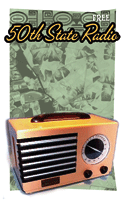
Check one more thing off Bill's lengthy "To Do List." In January 2006, Bill launched a weekly podcast featuring rare and out-of-print classics from his vast collection of Hawaiian music. The show, entitled Ho`olohe Hou (which is Hawaiian meaning "to listen again"), had a small but loyal following. But by August 2006, Bill caught the attention of a 24-hour-a-day Internet-based Hawaiian radio station, 50th State Radio, which partnered with Bill to turn his modest podcast into a weekly radio show with a much broader audience. Now, for two hours every Sunday, Bill shares with his thousands of listeners the evolution of Hawaiian music - the artists, the composers, the instruments, the influences, the various elements that when combined result in this unique indigenous art form. This program is unique, too, in that it is possibly the first endeavor in Hawaiian music "edutainment." To check out the program schedule and thoughts and playlists from previous shows, visit the Ho`olohe Hou blog.